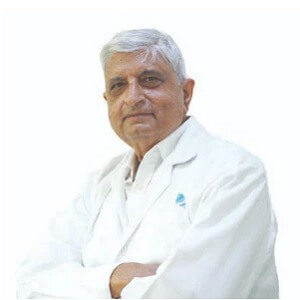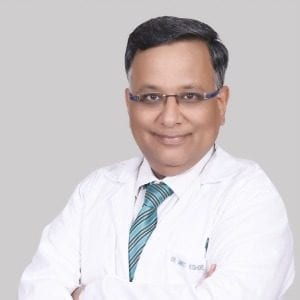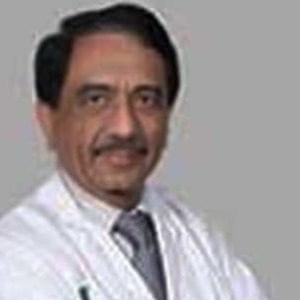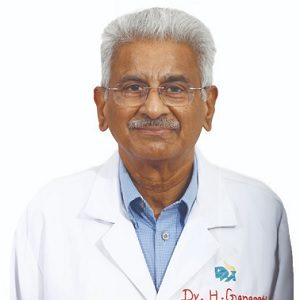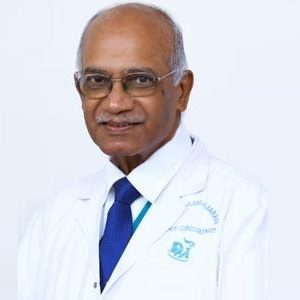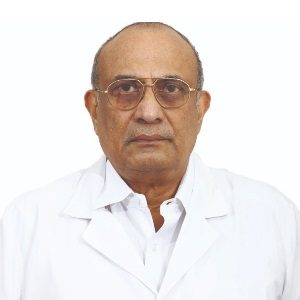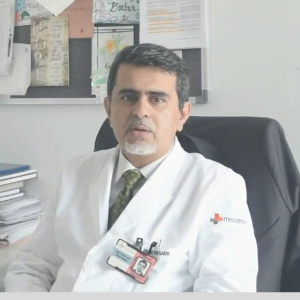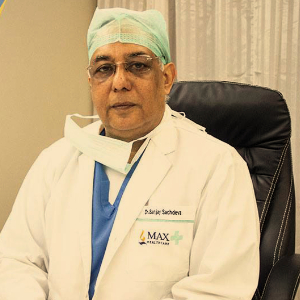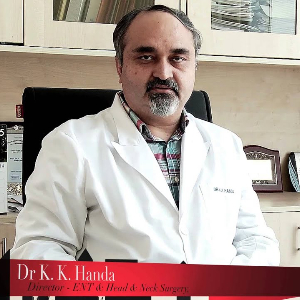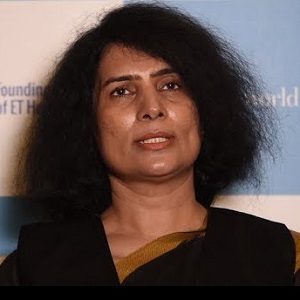Best Doctors in India for Stapedectomy
- ENT Surgeon, New Delhi, India
- Over 50 years experience
Profile Highlights:
- Dr. Sabir Husain Ansari is one of the best ENT/ Otorhinolaryngology surgeons in India practicing at Indraprastha Apollo Hospital. He holds nearly 50 years of experience in treating Sinus infections, sebaceous cysts, Epistaxis, Tonsillitis, and otoplasty.
- Dr. Ansari also helps with the hearing & speech evaluations in both children and adults. Being a specialized ENT doctor for nearly 36 years, he has competence in Micro Ear Surgery, Middle Ear Endoscopic, Neck Surgery, Nasal Surgery, Otoneurology, Pediatric ENT, Micro Laryngeal Surgery, Hearing Implant procedure, Endoscopic Sinus Surgery, and more.
- ENT Surgeon, New Delhi, India
- Over 20 years’ experience
Profile Highlights:
- With over 20 years of experience obtained in several parts of the world, including the UK, USA, etc. Dr. Ameet Kishore is known for providing the best treatment for all conditions of ear, nose, and throat, in children as well as adults.
- Dr. Ameet Kishore is quite experienced in otology and has performed microscopic ear surgeries for ear infections and reconstruction surgery for hearing. Having received his training from the National Center for Cochlear Implantation, he has extensive experience in managing deafness with cochlear implantation.
- Dr. Kishore has also set up the Cochlear Implant Program with a series of over 500 Cochlear Implants procedures in eight years. He is also one of India’s first surgeons who have carried out Auditory Brainstem Implantation.
- With experience in functional endoscopic sinus surgery, using specialized tools such as endoscopic camera systems, microdebrider, and balloon sinuplasty, he has also performed advanced endoscopic procedures.
- Dr. Ameet Kishore is also competent in treating child problems such as tonsils, glued ears, adenoids, as well as noisy and difficult breathing, as well as any problem that can affect the pediatric airway.
- ENT Specialist, New Delhi, India
- Over 30 years’ experience
Profile Highlights:
- A reputed ENT specialist, Dr. Arvind Soni has over 30 years of experience. His expertise are endoscopic nasal and sinus surgery, which includes skull-based surgery.
- Throughout his career, Dr. Arvind Soni has performed over 1400 operations.
- Also having worked as an ENT specialist with the Ministry of Health in Saudi Arabia.
- Dr. Soni has been awarded the Gold Medal for best paper at the All Indian Rhinology Conference.
- Being one of the finest ENT doctors in Delhi, his clinic is equipped with all modern equipment.
- ENT Surgeon, Chennai, India
- Over 44 years’ experience
Profile Highlights:
- Dr. Ganapathy H is one of the most experienced ENT specialists or Otorhinolaryngologists in South India, having more than 44 years of experience.
- He won several awards, including the Gold Medal in academics and career span.
- Dr. Ganapathy H has published several research papers in both national and international periodicals.
- ENT Surgeon, Chennai, India
- Over 45 years’ experience
Profile Highlights:
- Dr. Prabhakaran M is one of the best ENT specialists in Chennai, having an experience of more than 45 years.
- He is credited for performing over 4000 endoscopic laserisation of bronchial tumors.
- Dr. Prabhakaran is assisting patients with minor and major surgeries related to ENT.
- Dr. Prabhakaran presided over many regional and national ENT conferences.
- ENT Surgeon, Chennai, India
- Over 47 years’ experience
Profile Highlights:
- Dr. P S Reddy is a senior Otorhinolaryngologist or ENT surgeon in Chennai, having an experience of more than 4 decades in the field.
- Dr. Reddy excels in Tinnitus therapy, Audiometry Tests, and other services.
- Patients often seek his consultation for head and neck related problems, food, and drug allergies, respiratory, and vertigo.
- ENT, Head & Neck Onco Surgeon, Gurugram, India
- Over 20 years’ experience
Profile Highlights:
- Dr. Deepak Sarin is a well-known Head and Neck Onco surgeon with a specialization in oral and throat cancers.
- His interest lies in minimally invasive surgeries for head and neck cancer and is also an expert in Robotic and Laser surgery.
- He holds the credit for establishing the Head and Neck surgery department in Sir Ganga Ram & Artemis Hospital and also started the Head and Neck Surgery unit in Medanta.
- ENT Specialist, New Delhi, India
- Over 30 years’ experience
Profile Highlights:
- Dr. Sanjay Sachdeva is one of the most prominent ENT/ Otorhinolaryngologists in India with 30+ years of experience as a medical professional.
- He is currently working as the Senior Director in Max Super Specialty Hospital, New Delhi.
- Dr. Sanjay Sachdeva has received multiple awards and accolades for his incredible achievements in the field of Otorhinolaryngology.
- ENT, Head & Neck Surgeon, Gurugram, India
- Over 27 years’ experience
Profile Highlights:
- Dr. Kumud Kumar Handa is a highly acclaimed ENT and Head and Neck Surgeon in India with specializations in Head and Neck cancer surgery.
- Dr. K K Handa’s expertise in the field of ENT is prominent with the 27 years of experience that he has in the field.
- His area of interest includes voice surgery, laser surgery, endoscopic sinus surgery, cochlear implant surgery, and head and neck surgery. He has helped in the treatment of a number of head and neck cancer patients with different types of cancer surgeries.
- ENT Surgeon, Otorhinolaryngologist, Head and Neck Surgeon, New Delhi, India
- Over 30 years experience
Profile Highlights:
- Dr. Kalpana Nagpal is an ENT/Otorhinolaryngologist in India with extensive expertise. She has nearly three decades of experience in performing Microscopic and Endoscopic Surgeries for sinus infections, sebaceous cysts, epistaxis, tonsillitis, and otoplasty.
- Dr. Nagpal is a senior consultant for ENT at Indraprastha Apollo Hospital. She treats patients with congenital ear problems, orbital and optic nerve decompression, and tonsillectomy in both children and adults. Her area of expertise is Head & Neck Surgery.
- Dr. Nagpal also serves as the President of the Women Association of Otolaryngologists and is active in academics.
Best Hospitals in India for Stapedectomy
Indraprastha Apollo Hospital, New Delhi
- City: New Delhi, India
Hospital Highlights:
- Indraprastha Apollo Hospital is a 700-bedded multispecialty hospital in the heart of the capital of India. It is a part of Apollo Hospital group, one of India’s most reputed healthcare chains. Indraprastha Apollo Hospital has been accredited by Joint Commission International, making it the first internationally accredited hospital in the country in 2005.
- There are 52 specialties in the hospital with one of the best cardiology centers in the country. The hospital is also equipped with State of the art infrastructure facilities with the largest Sleep Lab in Asia and the largest number of ICU bed facilities in India.
- The hospital also has one of the largest dialysis units in India along with a dedicated Bone Marrow Transplant unit.
- The latest and highly advanced technologies that are installed in the hospital include Da Vinci Robotic Surgery System, PET-MR, PET-CT, Cobalt-based HDR Brachytherapy, Brain Lab Navigation System, Tilting MRI, Portable CT scanner, 3 Tesla MRI, 128 Slice CT scanner, DSA Lab, Endosonography, Hyperbaric Chamber and Fibro scan.
Fortis Memorial Research Institute, Gurugram
- City: Gurugram, India
Hospital Highlights:
- Fortis Memorial Research Institute is a multi-super-specialty, quaternary care hospital with 1000 beds. The hospital comprises reputed clinicians, and international faculty and is also equipped with cutting-edge technology. The hospital is a part of Fortis Healthcare Limited, a reputed chain of private hospitals in India.
- It is a NABH-accredited hospital that is spread across 11 acres of land and has a capacity of 1000 beds. The hospital has 55 specialties and is one of the premier health care centers in the Asia Pacific region popularly known as “the Mecca of Healthcare”.
- The hospital has 260 diagnostic centers and is also equipped with the latest and advanced techniques that include 3 Telsa which is the world’s first Digital MRI technology. The hospital also has world-class Radiation Therapy techniques which have been developed by leading technology experts from Elekta and Brain Lab.
Apollo Hospital, Chennai
- City: Chennai, India
Hospital Highlights:
- Apollo Hospitals, Chennai, is one of the best hospitals for heart care in India. Over the years, Apollo has expanded all over India, as a healthcare chain.
- India’s first ‘Only Pancreas’ transplant was performed in Apollo Hospital. The hospital is known for successfully performing Asia’s first en-bloc combined heart and liver transplant, and over the years, it has attained a remarkable achievement in the global healthcare space. Around 3-4 organ transplants are performed in the hospital per day.
- Equipped with over 500 beds, this hospital in Chennai was established in 1983 and since then has been among the most preferred hospital for patients from all over the world.
- The hospital holds accreditation of the NABH and JCI and is the first hospital in India to be ISO 9001 and ISO 14001 certified. It is also the first South Indian Hospital to receive subsequent reaccreditation from the JCI USA 4 times.
Medanta-The Medicity, Gurgaon
- City: Gurugram, India
Hospital Highlights:
- One of India’s best and largest multi-specialty hospitals, Medanta was built with the aim to bring India to the highest standards of medical care. The hospital has been providing the best medical services to its patients, since its inception, with care, commitment, and compassion.
- Equipped with 1250 beds, the hospital was founded by Dr. Naresh Trehan in the year 2009 with an aim to provide the best medical care at affordable costs. The hospital is spread across 43 acres and includes 45 operation theatres and 350 beds dedicated solely to ICU. The hospital includes over 800 doctors, and more than 22 specialty departments and has a dedicated floor for individual specialty in order to offer the best services under one roof.
- The hospital is considered one of the premier institutes in India for Cardiac Care and includes staffs and members of high caliber. The hospital has 6 distinct centers of excellence.
Max Super Specialty Hospital, New Delhi
- City: New Delhi, India
Hospital Highlights:
- One of the well-regarded providers in India committed to the highest standards of clinical excellence and patient care, Max Super Specialty Hospital is a part of Max Healthcare, which is the second-largest healthcare chain in India. Regarded as one of the most well-regarded healthcare providers in the country, Max Super Specialty Hospital is committed to the highest standards of clinical excellence as well as patient care. The hospital is also equipped with the latest technology as well as cutting-edge research. The hospital is known to deliver and ensure the highest level of patient care.
- The hospital has more than 500 beds and offers treatment for over 35 specialties. The hospital also holds the credit of having installed the first Brain Suite in Asia. This is a highly advanced Neurosurgical machine that allows MRI to be taken while surgery is ongoing.
- Other advanced and latest technologies are also installed in the hospital such as the 1.5 Tesla MRI machine, 64 Slice CT Angiography, 4D ECHO, LINAC, and 3.5T MRI machine.
Artemis Hospital, Gurugram
- City: Gurugram, India
Hospital Highlights:
- One of the most well-known hospitals in the Delhi NCR, Artemis Hospital is the first hospital in Gurugram to get accredited by the Joint Commission International.
- With more than 40 specialties, the hospital has been designed to be one of the most technically advanced hospitals in the country, with the best medical and surgical health care. The hospital has eleven special and dedicated centers, for Heart, Cancer, Neurosciences, etc.
- The latest technologies in the hospital include Endovascular Hybrid Operating Suite and Flat panel Cath Labs for the cardiovascular department, 3 Tesla MRI, 16 slice PET CT, 64 Slice Cardiac CT Scan, HDR Brachytherapy, and highly advanced Image Guided Radiation Therapy techniques (LINAC) are installed in the hospital.
- The hospital has won several awards as well, since its inception.
Gleneagles Global Hospitals, Chennai
- City: Chennai, India
Hospital Highlights:
- Established in 1999, Gleneagles Global Hospital, Chennai, is one of the top healthcare facilities in Southern India. It is part of the Gleneagles Hospital Chain, which is the fourth largest healthcare chain in the country. The hospital specializes in multi-organ transplants of kidneys, liver, lungs, heart, etc.
- The hospital has an excellent infrastructure and state-of-the-art lab and equipment set-up. The hospital boasts cutting-edge technologies, a highly skilled team of doctors and surgeons, and trained support staff. Located in Perumbakam, Chennai, it is one of India’s premier health care destinations. The hospital has performed some of the most complex surgical and clinical procedures in India including multi-organ transplantations.
- The hospital’s lung transplantation program is one of the best in the country. The hospital is known for having performed India’s first single lung transplant and first minimal invasive lung transplant. It is also the only Indian hospital to be associated with King’s College Hospital, London, United Kingdom for liver transplantations.
Fortis Hospital, Mulund, Mumbai
- City: Mumbai, India
Hospital Highlights:
- Fortis Hospital in Mulund is a 315-bed multi-speciality tertiary care hospital with five JCI accreditations that offers a wide variety of diagnostic and therapeutic services. The Fortis Hospital in Mulund delivers patient-centred treatment with cutting-edge technology, highly skilled and experienced surgeons, and paramedical staff.
- This institution houses Maharashtra’s largest multi-organ transplant centre. It is also the first heart transplant centre in western India to conduct 100 or more consecutive heart transplants in under four years. It is the only hospital in the city to have multi-organ transplants and has handled the youngest patient for angioplasty. Fortis Hospital Mulund now boasts the first advanced surgical robot in central Mumbai.
- Cardiology and heart surgery, urology, nephrology, neurosciences, orthopaedics, digestive care, emergency and critical care, and maternity care are among the services provided by the hospital.
Kokilaben Dhirubhai Ambani Hospital, Mumbai
- City: Mumbai, India
Hospital Highlights:
- Kokilaben Dhirubhai Ambani Hospital, Named after the wife of Indian industrialist Dhirubhai Ambani, the founder of Reliance Industries, this is one of the top hospitals in Mumbai. This 750-bed multi-specialty hospital became operational in 2009. Known as one of India’s most advanced tertiary care facilities, the hospital is designed to raise India’s global standing as a healthcare hub, with an emphasis on excellence in clinical services.
- Kokilaben Dhirubhai Ambani Hospital uses Protocol and Care Pathway based treatment models to ensure the best outcomes for patients.
- The hospital represents a confluence of top-notch talent, cutting-edge technology, state-of-the-art infrastructure, and, most importantly commitment.
- The hospital also holds the accreditation of the NABH, NABL, CAP, and JCI.
- The hospital has been recognized as the No. 1 Multispecialty Hospital in Mumbai and the West Zone for the fifth year in a row in 2020 by The Week.
Fortis Escorts Hospital, New Delhi
- City: New Delhi, India
Hospital Highlights:
- Over the last 33 years, the Fortis Escorts Heart Institute has set new standards in cardiac treatment with groundbreaking research. It is now known around the world as a centre of expertise for Cardiac Bypass Surgery, Interventional Cardiology, Non-invasive Cardiology, Paediatric Cardiology, and Paediatric Cardiac Surgery.
- The hospital has cutting-edge laboratories that perform a wide range of diagnostic tests in Nuclear Medicine, Radiology, Biochemistry, Haematology, Transfusion Medicine, and Microbiology.
- Fortis Escorts Heart Institute boasts a diverse group of bright and experienced doctors who are backed up by a team of highly qualified, experienced, and devoted support professionals as well as cutting-edge equipment such as the recently installed Dual CT Scan.
- Approximately 200 cardiac doctors and 1600 personnel currently collaborate to manage over 14,500 admissions and 7,200 emergency situations each year. The hospital now has a 310-bed infrastructure, as well as five cath labs and a slew of other world-class amenities.
Stapedectomy
Stapedectomy is a procedure used for the removal of the stapes bone in the ear. The stapes bone is the third of the three tiny bones in your middle ear as well as the one closest to the inner ear.
Though it is the smallest bone in the body, it has an important role in translating movement from your eardrum to the fluids in the inner ear, which causes sound waves to be changed into nerve impulses that can be translated in your brain.
Sound causes the stapes bone to vibrate. This vibration eventually passes into the fluid of the inner ear which enables hearing. When the stapes bone is unable to vibrate, it can lead to a decrease or loss of hearing.
Purpose
One of the most common reasons why people go for a stapedectomy is due to otosclerosis. Otosclerosis is a growth of bone around the stapes that can prevent its vibration, which ultimately leads to loss of hearing. Therefore, this leads to the requirement of surgery so that hearing can be improved. A stapedectomy involves removing your damaged stapes bone and replacing it with an artificial one. Sometimes surgery can also be done to correct the bone if it is fractured or abnormally shaped.
Patients suffering from otosclerosis and significant hearing loss are usually considered candidates for this procedure. Before the procedure, patients need to undergo an audiometric test, as well as a consultation with the ear surgeon to determine how appropriate a stapedectomy is going to be for him/her.
Preparation
Before your procedure, it might be important to give up certain medications for some time, as they can lead to complications during the procedure or recovery period. Your doctor will discuss with you which medications you will need to avoid. Also, make sure that you do not start taking any new medications, supplements or herbs without first consulting with your doctor.
Arrange for a ride home after the procedure. It is likely that you will need help at home during your recovery period so it is best if you can arrange for someone to help you in this period as well.
On the night before your procedure, it is likely that your doctor will recommend you to eat a light meal and not to eat or drink anything after midnight unless your doctor tells otherwise.
Procedure
First, your surgeon might use general or local anesthesia, depending on your procedure as well as your overall health.
If general anesthesia is used, you will be asleep during the entire procedure. If local anesthesia is used, the surgery area will be numbed. You might also receive a sedative to help you relax.
The surgery will involve your surgeon removing all or part of the original stapes bone and replacing them with an artificial device. This will allow sound waves to be sent once again to your inner ear for hearing.
Your surgeon will perform your procedure through your ear canal and uses an operating microscope. Then the eardrum is lifted for exposing the middle ear bones. Once the stapes are removed, your doctor will place the artificial device. Then the eardrum is put back into its position to heal. Packing material which is later absorbed by your body is used to hold it in place.
The procedure generally takes around 90 minutes and the majority of patients are able to go back home the same day.
After the procedure
You will be kept and monitored in a recovery area until you are ready to go back home. In some rare cases, an overnight stay might be required though in most cases, patients should be able to go home the same day.
While you are at the hospital, the staff will take some steps so that they can reduce your chance of infection such as keeping your incisions covered.
Results
Most patients are able to experience better hearing immediately after the surgery, but might sometimes report things that may not be normal. The feeling of fullness in the ear should go away once the packing around the eardrum has been absorbed and fluid drains away. Full improvement can take around three to four months.
Make sure that you follow the instructions provided by your doctor or the healthcare team.
Call your doctor if you experience any of the following:
- Signs of infection, including fever and chills
- Discharge having a foul odor
- Swelling, redness, increased pain, excessive bleeding or any green or yellow discharge from your ear
On average, 90 percent of patients usually have complete success from the surgery which can result in significantly better hearing. If inner ear functions are normal, it can result in the restoration of near-normal hearing.
Around seven percent of patients generally recover partial hearing after the procedure, while two percent of patients experience no change in the hearing level. There is also a chance that one percent of patients might experience worse hearing after the procedure.
Risks
Some of the few risks that are associated with this procedure include:
- Dizziness or vertigo
- Changes in taste
- Sensitivity to loud noise
- Tinnitus
- Injury to your facial nerve
- Infection

